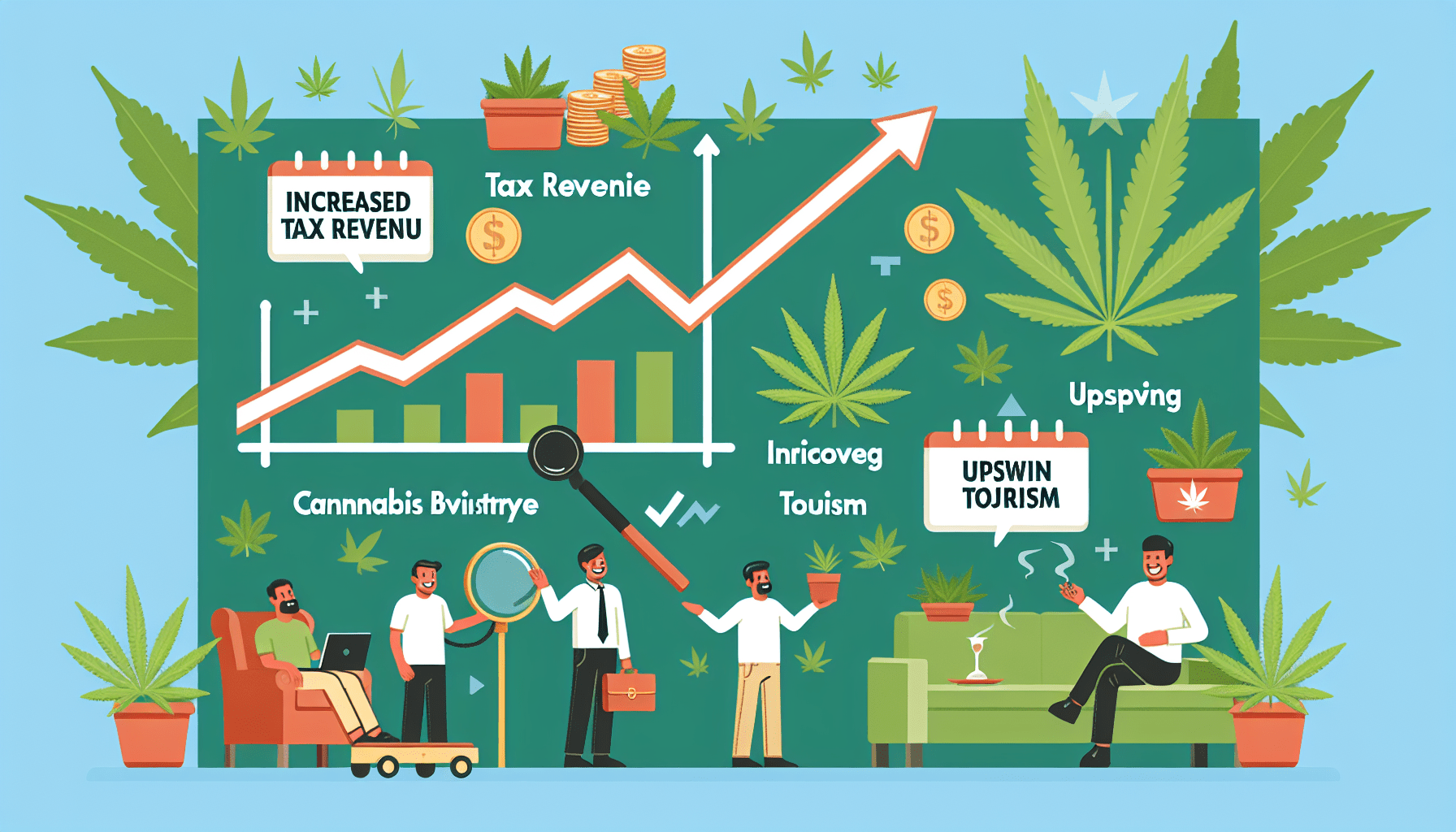So you’re curious about how cannabis legalization can actually benefit states economically, huh? Well, buckle up because I’m about to break it down for you. With an increasing number of states across the US legalizing cannabis for both medical and recreational use, there’s been a significant boost in revenue for these states. From tax revenue to job creation, the economic benefits are quite extensive. Not only does this provide a new stream of income for states, but it also helps to stimulate local economies and create opportunities for entrepreneurship. Let’s take a closer look at the ways in which cannabis legalization is making a positive impact on states’ financial health.

Increased Tax Revenue
Tax revenue from cannabis sales
One of the main economic benefits of cannabis legalization is the increased tax revenue generated from the sale of cannabis products. By legalizing cannabis, states are able to impose taxes on its production, distribution, and sale. These tax revenues can then be allocated to fund various public services, such as education, healthcare, infrastructure, and public safety. Moreover, the tax revenue generated from cannabis sales can help reduce budget deficits and provide additional funding for programs that benefit the community as a whole.
Additional sales tax revenue on related purchases
In addition to the tax revenue generated directly from cannabis sales, states also benefit from additional sales tax revenue on related purchases. Cannabis consumers often spend money on various ancillary products, such as cannabis accessories, apparel, and growing equipment. These purchases contribute to the overall economic growth of the state and provide additional revenue through sales taxes. This boost in sales tax revenue can have a positive impact on the state’s economy, further enhancing its fiscal position.
Tourism revenue
Cannabis legalization can also have a significant impact on tourism revenue. States that have legalized cannabis often become attractive destinations for cannabis enthusiasts from around the country and even worldwide. This influx of visitors to the state can greatly boost the local economy through increased spending on accommodations, restaurants, transportation, and entertainment. Tourism revenue not only benefits businesses directly involved in the cannabis industry but also creates job opportunities in a wide range of sectors, contributing to overall economic growth and development.
Job Creation
Creation of new jobs in the cannabis industry
The legalization of cannabis creates a multitude of job opportunities within the cannabis industry itself. This includes positions such as growers, processors, budtenders, transporters, and lab technicians, among many others. The growth of the cannabis industry provides employment opportunities for individuals from various backgrounds and skill sets, stimulating job creation and reducing unemployment rates. These jobs often offer competitive wages and benefits, contributing to the overall financial well-being of individuals and families.
Job growth in related industries
Furthermore, the legalization of cannabis also stimulates job growth in related industries. Ancillary businesses such as packaging companies, dispensaries, technology providers, marketing agencies, and security firms all benefit from the growth of the cannabis industry. These businesses rely on the demand created by the legalization of cannabis and consequently generate additional jobs in their respective sectors. The job growth in related industries not only diversifies the economy but also creates a ripple effect, leading to increased consumer spending and economic prosperity.
Reduced Law Enforcement Costs
Reduction in costs associated with enforcing cannabis laws
One of the significant advantages of cannabis legalization is the reduction in costs associated with enforcing cannabis laws. Law enforcement agencies often allocate a considerable amount of resources towards combating the illegal cannabis market, including conducting raids, making arrests, and prosecuting offenders. By legalizing cannabis, the need for such enforcement efforts diminishes, leading to cost savings for law enforcement agencies. These saved resources can be redirected towards addressing other pressing public safety concerns, ultimately making communities safer and more secure.
Decreased workload for law enforcement agencies
In addition to cost savings, the legalization of cannabis also leads to a decreased workload for law enforcement agencies. With the elimination of cannabis-related offenses, officers can focus their time and efforts on addressing more serious crimes and maintaining public order. This allows law enforcement to allocate their resources more efficiently, leading to greater overall effectiveness in combating crime and ensuring the safety of communities. The reduced workload also improves the relationship between law enforcement and the general public, fostering a sense of trust and cooperation.
Savings in Criminal Justice System
Reduced incarceration costs for non-violent cannabis offenders
The legalization of cannabis also results in savings in the criminal justice system, particularly in terms of reduced incarceration costs for non-violent cannabis offenders. In many states, individuals found in possession of cannabis were subjected to arrests and imprisonment, resulting in strains on the correctional system. Legalizing cannabis removes the criminal penalties associated with its possession and reduces the number of individuals incarcerated for non-violent cannabis offenses. This reduces the burden on the prison system, saving taxpayers’ money and allowing resources to be allocated towards more effective rehabilitation programs.
Savings in court and legal system expenses
Furthermore, the legalization of cannabis leads to savings in court and legal system expenses. Prosecuting cannabis-related offenses often entails significant costs related to court proceedings, legal representation, and administrative processes. By eliminating the need to prosecute and adjudicate cannabis offenders, the legal system can operate more efficiently and direct its resources towards more pressing cases. These savings contribute to the overall efficiency of the justice system and can be reinvested in other areas, such as improving access to justice or implementing alternative dispute resolution strategies.

Boost to Local Businesses
Increase in sales for local dispensaries and growers
Cannabis legalization provides a significant boost to local businesses, particularly for dispensaries and growers. With the legal market, individuals who were previously purchasing cannabis from the illicit market can now access regulated and safe products from licensed dispensaries. This shift in consumer behavior leads to a surge in sales for local dispensaries, allowing them to expand their operations, hire more employees, and contribute to the local economy. Similarly, legalized cultivation creates opportunities for local growers to sell their products legally, further stimulating economic growth at the community level.
Support for ancillary businesses like packaging and logistics
In addition to the direct impact on dispensaries and growers, cannabis legalization also supports ancillary businesses in the industry. These businesses include packaging companies, logistics providers, security services, and marketing agencies, among others. The growth of the legal cannabis market creates a demand for various goods and services, which in turn supports the expansion of these ancillary businesses. This symbiotic relationship between the cannabis industry and its ancillary businesses fosters economic growth, job creation, and innovation within the local business community.
Job creation in retail and service sectors
The boost to local businesses extends beyond the cannabis industry itself and creates job opportunities in the retail and service sectors. The increased demand for cannabis products leads to the expansion of dispensaries, requiring additional staff to support customer service, sales, and product education. Moreover, the growth in the cannabis industry also stimulates the hospitality sector, as tourists and visitors seek accommodations, dining options, and entertainment opportunities. These job opportunities in retail and service sectors provide individuals with employment options, contribute to the local workforce, and enhance the overall vitality of the community.
Agricultural Benefits
Diversification of crop options for farmers
Cannabis legalization offers agricultural benefits by diversifying crop options for farmers. Traditionally, farmers have relied on crops such as corn, soybeans, and wheat. However, by legalizing cannabis, farmers now have the opportunity to cultivate a new crop that has significant market demand. This diversification not only improves the farmers’ economic viability but also enhances the resilience of the agricultural industry as a whole. Cannabis cultivation presents an additional revenue stream for farmers, allowing them to adapt to changing market dynamics and reducing their vulnerability to price fluctuations and other agronomic challenges.
Potential for hemp production and associated industries
In addition to cannabis cultivation, legalization also opens up opportunities for hemp production and associated industries. Hemp is a variety of the cannabis plant that contains minimal amounts of THC (the psychoactive compound) and is used for various industrial purposes. The legalization of cannabis often goes hand in hand with the legalization of hemp, allowing farmers to legally grow this versatile crop. Hemp is used in the production of textiles, paper, biofuels, building materials, and numerous other products. The potential for hemp production provides farmers with new markets and revenue streams, further boosting the agricultural sector and promoting sustainability.

Tourism and Hospitality Industry Growth
Attraction of cannabis tourism
The legalization of cannabis has the potential to attract cannabis tourism, resulting in significant growth for the tourism and hospitality industry. States that have legalized cannabis often become popular destinations for cannabis enthusiasts, who are interested in exploring the legal market in a safe and regulated environment. This influx of cannabis tourists contributes to the local economy through increased spending on accommodations, restaurants, transportation, and entertainment. Cannabis tourism creates a unique niche market, attracting visitors who may not have otherwise considered the state as a travel destination.
Increased demand for accommodations, restaurants, and entertainment
The growth of cannabis tourism not only benefits dispensaries but also stimulates demand for accommodations, restaurants, and entertainment. Cannabis tourists require places to stay, dine, and experience local attractions, leading to increased bookings for hotels, vacation rentals, and bed and breakfast establishments. Restaurants and entertainment venues can also capitalize on this demand by offering cannabis-friendly experiences and tailored services. The increased demand in these sectors generates revenue, creates jobs, and enhances the overall appeal of the state as a tourist destination.
Research and Development Opportunities
Funding for cannabis research
The legalization of cannabis provides opportunities for research and development in the field of cannabis science. With the legal market, researchers have access to a larger pool of cannabis products for scientific investigation. This includes studying the potential medical benefits, exploring different cultivation techniques, and investigating the impact of cannabis on society. Governments and private organizations often allocate funding for cannabis research initiatives, which can lead to advancements in medical treatments, agricultural practices, and various other fields. The availability of funding for cannabis research creates a platform for scientific discovery and innovation.
Potential for scientific and medical advancements
Cannabis legalization also holds significant potential for scientific and medical advancements. With increased research opportunities, scientists can explore the therapeutic properties of cannabis compounds and their potential applications in treating various medical conditions. Cannabinoids such as CBD and THC have shown promise in pain management, epilepsy treatment, and alleviating symptoms of certain chronic diseases. Legalization enables medical professionals to have access to regulated cannabis products, leading to improved patient care and expanded treatment options. The scientific and medical advancements resulting from cannabis research can have far-reaching implications, improving the health and well-being of individuals worldwide.

Reduced Drug-related Violence and Crime
Elimination of black market
One of the primary benefits of cannabis legalization is the elimination of the black market. Illicit cannabis trade often involves criminal organizations and gangs, contributing to drug-related violence and crime. By legalizing cannabis, the legal market offers a safe and regulated alternative for consumers, effectively removing the need for individuals to engage in illicit activities. The elimination of the black market not only enhances public safety but also reduces the associated costs of law enforcement efforts targeted at combating drug-related crime.
Decreased involvement of gangs in cannabis trade
The legalization of cannabis also reduces the involvement of gangs and criminal organizations in the cannabis trade. These illegal entities often profit from the production and distribution of cannabis in the black market. By legalizing cannabis, legitimate businesses can enter the market, providing consumers with a regulated and safer option. This shift in the dynamics of the cannabis industry reduces the influence of gangs and criminal organizations, ultimately making communities safer and more secure. The decreased involvement of gangs in the cannabis trade fosters an environment of lawfulness and reduces the associated social costs.
Economic Impact beyond Cannabis Industry
Multiplier effect on overall economy
The economic impact of cannabis legalization extends beyond the cannabis industry itself and has a multiplier effect on the overall economy. The increased tax revenues, job creation, and consumer spending resulting from the legalization of cannabis have ripple effects throughout various sectors. Local businesses benefit from the increased demand, generating additional revenue and creating job opportunities. This, in turn, further stimulates consumer spending, leading to increased economic activity and growth. The multiplier effect amplifies the positive economic impact of cannabis legalization, resulting in a more prosperous and resilient economy.
Increased disposable income and consumer spending
Cannabis legalization also leads to increased disposable income and consumer spending. With the legal market, consumers can purchase cannabis products openly and legally, without fear of legal repercussions. The money previously spent on illegal cannabis transactions can now be redirected towards legal purchases, supporting the local economy. The increased disposable income not only benefits the cannabis industry but also stimulates spending in other sectors, such as retail, hospitality, and entertainment. This increased consumer spending generates revenue for businesses, creates job opportunities, and injects vitality into the local economy.
In conclusion, the legalization of cannabis brings forth significant economic benefits for states. The increased tax revenue from cannabis sales, additional sales tax revenue from related purchases, and tourism revenue contribute to the financial well-being of states. Job creation in the cannabis industry and related sectors stimulates employment opportunities and boosts overall economic growth. Reduced law enforcement costs, savings in the criminal justice system, and a decrease in drug-related violence and crime lead to increased efficiency and improved community safety. The boost to local businesses, agricultural benefits, and the potential for scientific and medical advancements further enhance the economic impact of cannabis legalization. Lastly, the multiplier effect on the overall economy and increased disposable income and consumer spending solidify the positive economic outcomes of cannabis legalization. As more states consider the potential economic benefits, cannabis legalization continues to gain traction as a viable and profitable policy option.
